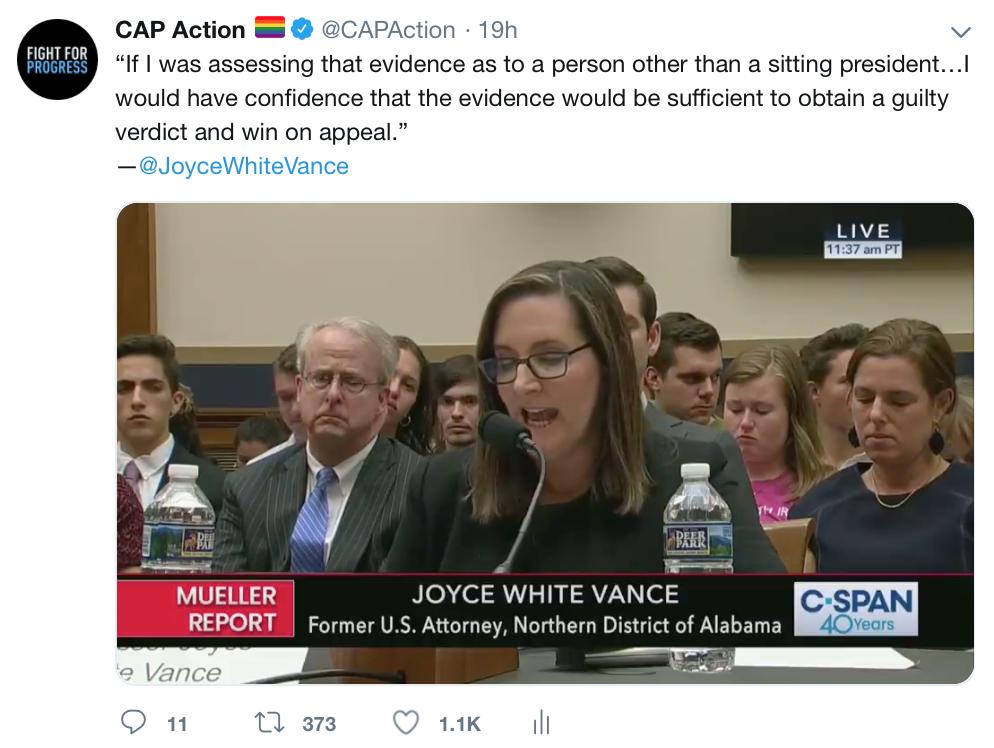Former federal prosecutors lay out Mueller’s damning case against Trump
If there’s one crystal clear takeaway from yesterday’s hearing on the Mueller report, it’s this: Donald Trump intentionally committed obstruction of justice, and if he weren’t president, he’d be facing multiple felony charges.
Despite Trump’s lies, despite his hand-picked attorney general’s cover-up, despite his Congressional allies’ willingness to obstruct and lie for him, Trump is in trouble.
Mueller’s report speaks for itself, as the special counsel himself said it would, and it tells the story of a candidate and team who committed multiple crimes in pursuit of the most powerful office in the world—then committed more crimes to cover those up.
Share this clip to demand action: Mueller’s report details Trump’s crimes. Now, it’s Congress’s job to investigate them and go where the facts take them, because no one—not even the president of the United States—is above the law.

As CAP Action’s Moscow Project put it on the day it was finally released, “The Mueller Report, like the Watergate Roadmap, Should be Considered an Impeachment Referral.” The witnesses yesterday agreed.
Here are five key takeaways from yesterday’s hearing:
- The Mueller report is a road map for Congress: As former White House counsel and key Watergate witness John Dean said yesterday, “In many ways, the Mueller report is to President Trump what the so-called Watergate road map…was to President Richard Nixon.”
- More specifically, the report is an impeachment referral: Congress has a duty to read it as such. Barbara McQuade, a former federal prosecutor and witness at yesterday’s hearing, tweeted this today: “Trump committed multiple acts of obstruction of justice. His efforts harmed national security by shielding from scrutiny an attack on our country by a foreign adversary. Mueller couldn’t charge but Congress can impeach.”
- Mueller’s report does NOT clear Trump of collusion: Despite what some Committee Republicans insisted, Mueller’s report doesn’t even address the issue of collusion. It focuses on a narrow definition of criminal conspiracy. As Joyce White Vance pointed out yesterday, “There is abundant evidence of collusion in this record.”
- Trump intentionally threatened our national security: And he would have succeeded if his team had followed his orders. Per McQuade yesterday, “By seeking to curtail the [Mueller] investigation, President Trump committed an act that threatened the national security of this country.”
- Trump WANTED to obstruct justice: That’s a critical point, because intent is a key component of obstruction of justice. Mueller’s report shows that Trump “wanted to take these acts, that he was not committed to truth in the criminal justice system, that he wanted to divert it away from truth for his own benefit.”
Chairman Jerry Nadler closed yesterday’s hearing with this: “This is not a bogus investigation of a false allegation, but a necessary investigation of a threat to our country and liberty. This committee and this Congress have an absolute obligation to the American people to investigate this.”
House Democrats’ investigations into Trump’s crimes continue tomorrow, as Chairman Adam Schiff leads the House Intelligence Committee’s hearing on “Lessons from the Mueller Report: Counterintelligence Implications of Volume 1.” Tune in at 9am EST.